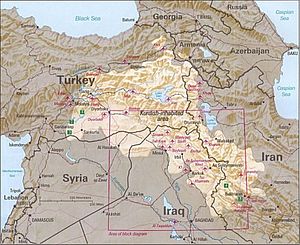Given fast-moving events in northern Iraq these past few weeks, the prospect of an independent Kurdistan emerging from the rubble looks increasingly likely. For the Western powers, there are several good reasons to support an independent Kurdistan: the region would likely be a relatively well-governed, stable, pro-Western ally (Amitai Etzioni makes this argument in greater detail elsewhere on The Diplomat). However, for China, which has remained tight-lipped mostly on the sidelines of this conflict so far, an independent Kurdistan could be a step too far. Since Mao and the Communists united China in the 1940s, a mainstay of Chinese communist foreign policy has been an opposition to separatism at all costs. Beijing does this not only due to its own Taiwan situation, but also because of fears that witnessing successful separatist movements elsewhere in the world could galvanize separatism in Xinjiang, Tibet, and Inner Mongolia.
Beyond mere philosophical opposition to an independent Kurdistan, China has important economic stakes in the region. Since 2009, when Sinopec acquired Addax Petroleum, which was developing the Taq Taq oil field in Iraq’s Kurdish region, Kurdish Iraq has become a major economic nexus for China. In recent years, Chinese investment in Kurdish oil fields and infrastructure has been rising rapidly, and several hundred Chinese citizens live and work in the region. Following the United States’ 2003 invasion of Iraq, the Iraqi government formalized Kurdistan’s post-1991 high degree of autonomy within the Iraqi state, allowing the region to effectively conduct itself as a state (i.e. set its own foreign policy, manage its own defense, etc). The reason the region isn’t a country yet is because of a convoluted oil-sharing agreement between the government in Baghdad and the Kurds.
[...]































